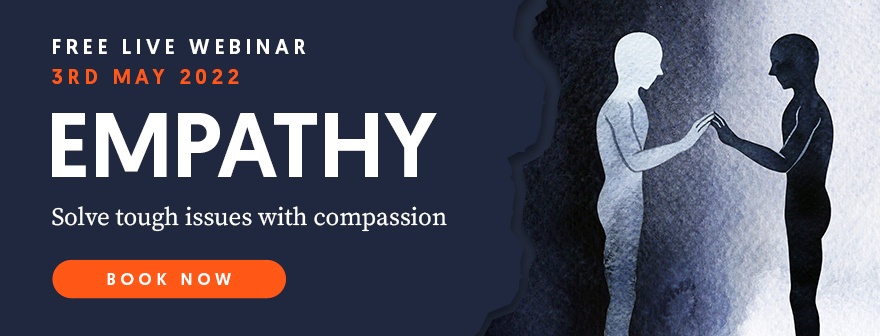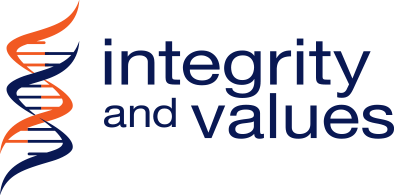Unlock Your Teams’ Potential with Robust Conversations
The most powerful conversations that leaders will have are those that are robust. These timely, results-orientated conversations allow all parties to ask difficult questions and test news ideas. For leaders, this open dialogue lets them lean into what their people have always wanted to say to them while also collaboratively uncovering new ways of propelling their organisation forward.
Most importantly, it allows both leaders and their people to feel seen, heard and valued.
In the face of organisational and global pressures, it has never been more important for leaders to communicate effectively with their people. When the pressure mounts, teams look to them to understand and process high-pressure situations.
This does involve leaders having difficult conversations.
Difficult Conversations are Unavoidable
“Early in my career, I remember an incident when I challenged one of my team. Severely embarrassing them, scaring everyone else and alienating myself. It was a big wake-up call getting the full impact of who I was and the effect I had on others.” – Jennifer Elliott.
Difficult conversations are characterised as poorly structured confrontations initiated in frustration and with minimal positive returns. They are frequently top-down, closed discussions with little room for the other party to express their perspective.
The reality is that no one wins from these types of conversations. They breed resentment and mistrust and pitches leaders and their people against each other in a battle to gain the upper hand.
As leaders, we cannot avoid difficult conversations.
We asked a client of ours how much it cost them, not saying what needed to be said. This CEO of a medium-sized organisation said “millions”. This is not to mention the risk of decreasing team engagement and morale, which are arguably harder to restore once diminished.
The Path Forward is With Robust Conversations
Robust conversations are difficult discussions handled well.
They are meaty dialogues where all viewpoints are welcomed, from which new opportunities are created. These productive conversations are driven by facts, not emotional biases, and have the potential to produce creative solutions with actionable feedback. Coming into the conversation, being open allows all to leave with a defined path forward.
How can Leaders Create Space for Robust Conversations?
Many leaders resist difficult conversations to avoid conflict with their people. They often fear hurting their people’s feelings and not being in control of the outcome.
However, difficult conversations can be handled with the right tools. As Leaders, our ability to say and hear the difficult things from our people creates psychological safety. This results in everyone being able to table different ideas and thoughts, which leads to innovative solutions.
Integrity and Values’ Secrets to Success framework provides an outline for ensuring that your business is one where robust conversations are welcomed.
A clear vision and set of values align your people with your business. It creates a common language ensuring leaders and teams are making decisions, holding either other accountable using the same platform for their conversations.
Any movement away from these core values is a trigger for a robust conversation. Whenever leaders identify misaligned behaviour with the business’ vision, it’s an opportunity to discuss concerns and course correct.
When leaders don’t say what needs to be said, impatience and irritation builds, and things are said in the heat of the moment. This is what we call the ‘dirty fight’. We spend 90% of our time getting leaders to clean up the fight they have with themselves, being aware of how they externalise that fight and its impact.
Learning to ‘fight clean’ is the biggest challenge for leaders. When we clean up our fight, we are able to invite others to be a contribution to us and the business, collaboration increases, and productivity goes up.
We spend most of our waking hours at work – how do we create a fun and engaging environment. Fun is not drinks on Friday night, BBQ three times a year and a Christmas party. People get drunk and tell you and each other what they really think, and you have an HR problem on Monday. Fun at work satisfies 7 essentials, and when you do, work occurs as a form of play. When you are intentional, you will create an engaging environment, and you will be rewarded with a delighted and empowered workforce.
When this happens, meaningful conversations take place. Your team develops a sense of ownership as they see the business succeed.
As a Leader, you WILL navigate conflict!
Put people together, and conflict is inevitable. Conflict isn’t the problem, rather it is our avoidance of it and ignoring it, and PLAYING NICE does not resolve the friction – it does the absolute opposite. This ‘cover up’ job causes more issues than if we went in and addressed the elephant in the room.
Our acronym for ‘NICE’ is ‘Nothing In me Cares Enough’ to tell you the truth. When we play NICE, we are setting this as the culture, and those important robust conversations are not had. We pretend that we are protecting other people when we are actually protecting ourselves, so we are not exposed. When we own that we are doing this, we free ourselves and the people we lead.
Leaders can use a proven tool to initiate a robust conversation by simply preparing their people for information that may be tough to hear. This is called the Inoculation Tool, which allows you to have a discussion with integrity and respect by saying:
“You’re not going to like what I have to say”
“I may upset you with this”
‘There’s something really important I want to talk to you about, and my concern is that you will get upset and I’m going to have to say it to you, and so I’m apologising upfront if this upsets you – my intention here is that we move forward.’
These conversation openers serve several purposes. They demonstrate your sensitivity and empathy for your people while being firm and deliberate in what you want to say. Not only do your people start to listen and engage with you actively, but the dignity you show them in these instances earns you trust and respect.
There is a full article you can read about how to use this tool – here.
How can Leaders Turn a Difficult Discussion into a Robust Conversation?
Leaders must take the initiative to change the course of the conversation if they’ve started on the wrong foot with their people. In fact, leaders who fail to repair a communication and relationship breakdown immediately can contribute to a build-up of discontent and bitterness among teams.
If you find yourself caught in a conversation that feels more difficult than robust, here’s ‘Integrity and Values’ approach to reversing the fall-out.
Restore integrity
In the face of a poorly worded discussion, leaders gain credibility when they acknowledge their own mistakes. Many will find that it is easier to identify what the other person has done wrong. Owning up to how you’ve contributed to the bad conversation demonstrates courage and integrity.
Clean up
Seek to understand the bad conversation’s impact on your people. Asking inquisitive, open-ended questions and actively listening allows people the space and safety to share thoughts and concerns. This becomes the starting point for negotiating how all parties can take the next necessary steps to move forward.
Move on
Once a new solution is decided on, leaders are reminded to be consistent and accountable when it comes to the promises they make. Keeping your word is paramount for rebuilding integrity, and your people will be watching to ensure that your intentions and actions align.
It Starts with You: The Organisational Leader
Robust conversations are the foundation for a dynamic business that can respond to difficult situations. Like many areas of organisational life, it too starts at the top.
We invite you to create space for new connections and opportunities by using the tools that we’ve shared on Robust Conversations. Do it with courage, integrity and tact, and the rewards you gain will be well worth the time and effort you invest in becoming a more effective communicator.







